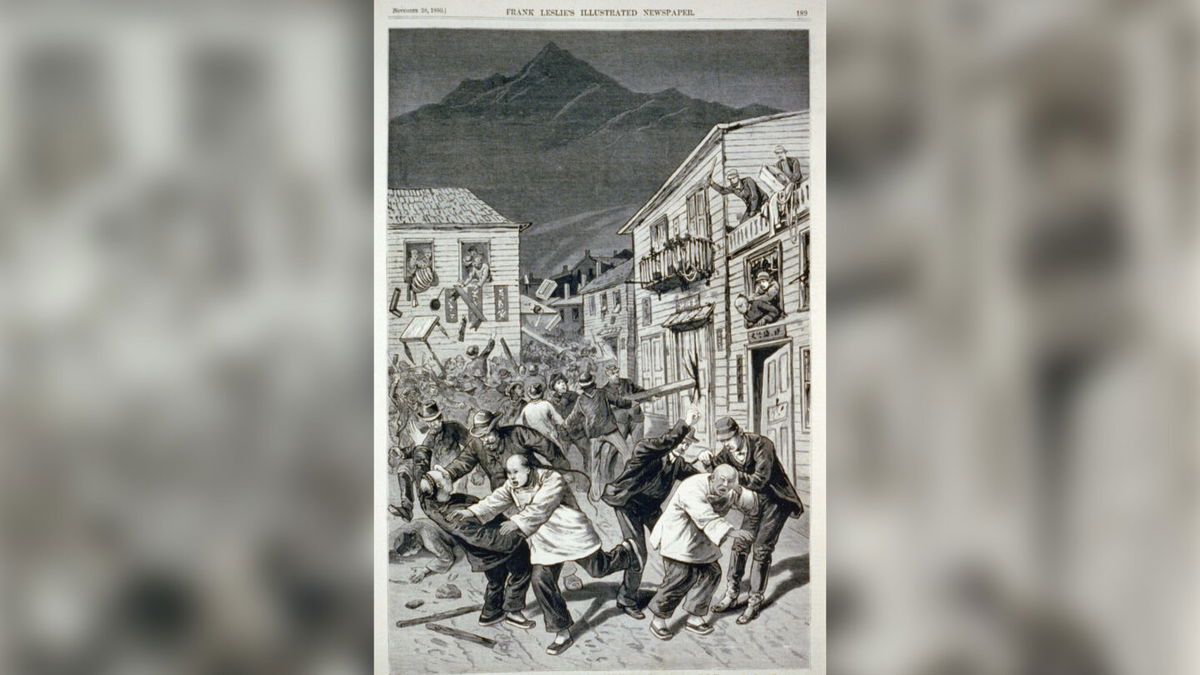Denver is the latest city to apologize for its history of anti-Chinese racism

The anti-Chinese riot of October 31
By Harmeet Kaur, CNN
Denver has formally apologized to early Chinese immigrants and their descendants for its role in an 1880 riot that destroyed the city’s Chinatown.
In an ceremony on April 16, Mayor Michael B. Hancock presented an apology letter to families whose ancestors had been targeted by xenophobia and mob violence in Denver more than a century ago.
“To heal, we must be willing to face and address themes we have avoided, apologize for wrongs we have committed and follow through with the actions that are true to ongoing positive change,” he said at the event.
The first Chinese immigrants reportedly arrived in Denver in the late 1860s, relegated to enclaves where they faced poor living conditions, as historian William Wei detailed in his book “Asians in Colorado: A History of Persecution and Perseverance in the Centennial State.” Over the next decade, many Chinese opened their own laundry businesses, and the area where they lived and worked became a thriving commercial district.
As Denver’s Chinatown prospered, many of the city’s White and European residents came to resent Chinese immigrants and scapegoated them for an array of issues. On October 30, 1880, political organizers held an anti-Chinese parade in advance of the presidential election, as CNN reported last year. The next day, a fight broke out at a bar and morphed into a mob that would end in the lynching of a Chinese man. Numerous other Chinese residents were attacked and beaten, and properties in the neighborhood were decimated.
RELATED: Burned from the land: How 60 years of racial violence shaped America
Survivors were never compensated for the estimated tens of thousands of dollars they were believed to have lost, according to History Colorado. Today, there’s hardly a trace of the vibrant Chinatown that once was.
The city of Denver said in its apology letter that its police force failed to keep Chinese residents safe leading up to and during the violence, and that it failed to hold the perpetrators in the lynching of a Chinese man accountable. In later years, the apology states, Denver aggressively harassed Chinese residents and raided their communities while enforcing the federal government’s Chinese Exclusion Act of 1882.
Other cities have made similar apologies
Denver is the fifth city in the US known to have formally apologized for its history of anti-Asian discrimination and violence, and the first outside California to do so. The 1880 riot was one of several such instances in the late 19th and early 20th centuries that targeted Asians in the West, and since last year, San Francisco, Los Angeles, San Jose and Antioch have also apologized for past racism and discrimination against Chinese immigrants.
Advocates for Asian American and Pacific Islander communities in Denver said the apology was an important step.
“This is a start for a movement where we really start to recognize and honor the legacies of our communities,” Joie Ha, who serves as vice-chair of the Colorado Asian Pacific United, told CNN affiliate KCNC-TV. Colorado Asian Pacific United helped lead the April 16 apology event.
Denver also said in its apology letter that it was “committed to supporting the establishment of an Asian Pacific Historic District, sponsoring the painting of public murals depicting the history and culture of Asian Pacific Coloradans, partnering on the development of a public education program about Asian Pacific Coloradans, and founding an Asian Pacific American community museum.”
The-CNN-Wire
™ & © 2022 Cable News Network, Inc., a WarnerMedia Company. All rights reserved.
CNN’s Tami Luhby, Breeanna Hare, Channon Hodge contributed to this report.